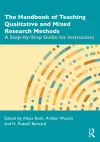
The Handbook of Teaching Qualitative and Mixed Research Methods
3 contributors - Paperback
£41.39 was £45.99
Section 1. Research Ethics
1. Teaching Ethics in Qualitative Research
Pranee Liamputtong
2. Obtaining Consent: Why, What and How
Isaac K. Nyamongo
Section 2. Sampling in Qualitative Research
3. Teaching Qualitative Sample Size Estimation
Monique Hennink
4. Non-probability Sampling
Amber Wutich and H. Russell Bernard
5. Collecting Data from Networked Populations: Snowball and Respondent-driven Sampling
Katherine R. McLaughlin
6. Sampling Design for Qualitative Research: Teaching Theoretical Sampling for Cross-cultural Research
Ashley K. Hagaman and Kripa Sigdel
Section 3. Interviewing as Data Collection
7. Teaching Interviewing: How to Guide Conversations for Qualitative Research
Kathryn Roulston
8. Cognitive Interviewing for Questionnaire Design and Evaluation
Gordon Willis
9. Ethnographic Interviewing: The Life of Language among Families
John Baugh
10. Free-list Interviewing
Susan C. Weller
11. Qualitative Interviewing in the Study of Culture
Jeffrey C. Johnson
12. Personal Network Analysis
Christopher McCarty and José Luis Molina
13. A Strategy to Practice Moderating in Focus Groups
David L. Morgan
14. Focus Group Interviewing Method
Pranee Liamputtong
Section 4. Observations as Data Collection
15. Participant Observation: How to Be a Participant and Observer at the Same Time
Elli W. Sugita
16. Observation as Data Collection
Noleen Rutendo Chikowore
17. How Behavior Observations Enrich Qualitative Researchers
Raymond Hames
18. Ethnography: A First Overarching Look
Andrea Ballestero and Melanie Ford Lemus
19. Rapid Ethnographic Assessment
Thurka Sangaramoorthy and Karen A. Kroeger
20. Teaching Field Notes
Casey Burkholder and Jennifer A. Thompson
21. Ethnographic Writing
Julia Pauli
22. Teaching Reflexivity and Positionality
Pardis Mahdavi
23. Autoethnography: Sensitizing the "I"
Elizabeth Ettorre
24. Social Media Data Analysis
Wenwen Li and Zhining Gu
25. Shooting Video for Social Science Research
Jerome Crowder and Elizabeth Cartwright
Section 5. Indigenous and Decolonizing Methods
26. A Brief Introduction to Critical Indigenous Research Methodologies
Bryan McKinley JonesBrayboy and Danielle D. Lucero
27. Ethically Engaging Marginalized Communities in Research
Meskerem Z. Glegziabher
28. Talanoa Research Methodology: Strategies for Teaching an Indigenous Methodology
Caleb Marsters and Jessica Hardin
29. Centering Indigenous Practice: Talking Circles as Participatory Action Research
Mona Scott Figueroa
30. Indigenous Data Sovereignty and Governance
Stephanie Russo Carroll and Jewel J. Cummins
31. A Black Feminist Life History Method: How to Center Black Women’s Voices
Irma McClaurin and Shan-Estelle Brown
32. Sister–girl Talk: A Method for Group Interviewing Black Women
Charlayne F. Mitchell
33. Community-engaged Partnership Research
John S. Luque and Dinorah Martinez Tyson
34. Theater as Ethnographic Method
Carolina Alonso Bejarano
Section 6. Visual and Participatory Methods
35. Photovoice and Participatory Visual Elicitation Methods
Krista M. Harper and Brittni D. Howard
36. Teaching Ethnographic Photovoice as a Method for Studying Marginalized Groups
Richard Dimba Kiaka
37. Digital Storytelling as a Tool for Critical Narrative Research
Alice Fiddian-Green and Aline Gubrium
38. Introduction to Interactive 3D e-Participatory Methods through the Lens of Urban Planning Projects
Thibaud Chassin
39. Art-based Methods for Qualitative Research with Younger Children
Alexandra Brewis and Alissa Ruth
40. Reflecting on Place: Group Sketch Mapping
Ayla De Grandpré, Jon Corbett and Logan Cochrane
Section 7. Building Blocks and Basis of Analysis
41. Transcription: Understanding Its Analytical Power
Cindi SturtzSreetharan
42. Handling Multilingual Data: Transcription and Translation
Katharina Resch
43. Teaching Theme Identification
Melissa Beresford and H. Russell Bernard
44. Finding Themes Using the Cutting and Sorting Approach: Guided Exercises with Interview Data
Fernanda Baeza Scagluisi
45. Creating Visual Variables: A First Step in Systematic Analysis of Videotaped Data
Elizabeth Cartwright and Jerome Crowder
46. Developing a Codebook for a Case Participant
Johnny Saldaña
47. Coding in Action: Applying Codes at Various Levels
Margaret V. du Bray
48. Teaching Intercoder Reliability Assessment
Cliódhna O’Connor and Helene Joffe
49. Teaching Qualitative Content Analysis
Udo Kuckartz and Stefan Rädiker
50. Context Matters: Conducting Word-based Analysis in Qualitative Research
Margaret V. du Bray
Section 8. Grounded Theory, Phenomenology and Narrative Analysis
51. Doing Grounded Theory: Key Steps for Design, Data Collection, and Analysis
Geraldine Foley
52. Phenomenological Interpretation: A Creative Lesson on Lived Experience
Bibek Dahal
53. Narrative Analysis
Roberto Franzosi
54. Narrative Analysis: The Narrated, Non-narrated, and the Disnarrated
Cecilia Vindrola-Padros and Laura Maio
55. Teaching Meaning and Idioms in Life History Narratives
Emily Mendenhall
Section 9. Linguistic Analysis
56. Corpus Linguistics and Its Role in Qualitative Research
Kieran Harrington
57. Teaching about Variation
Liam Gleason and Cindi SturtzSreetharan
58. Analyzing Language as Actions-in-interaction
Nigel Musk and Silvia Kunitz
59. Teaching Indexicality through a Focus on Identity
Rosalyn Negrón
60. Teaching Discourse Analysis Using Political Texts
Rosalyn Negrón
61. Using Critical Discourse Analysis to Understand Texts in Context
Jennifer Smith-Merry and Justin McNab
Section 10. Network Analysis and Cultural Domain Analysis
62. Mixed Semantic Network Analysis to Explore Discoursive and Cultural Landscapes
Christine Moser and Nikita Basov
63. Walking in Your Footsteps: Using Qualitative Methods in Whole Network Analysis
Elisa Bellotti
64. Mapping the Structure of a Cultural Domain: Cultural Domain Analysis
Victoria Reyes-García and Xiaoyue Li
65. Measuring Cultural Consonance
Rosane Pilot Pessa and William W. Dressler
Section 11. Modeling and Comparative Analysis
66. Topic Models: Modeling from Text Corpora
Michael Simeone
67. Agent-based Modeling in Mixed Methods Research
Mark Moritz, Chelsea E. Hunter, Daniel C. Peart, and Ian M. Hamilton
68. Teaching Meta-themes: A Mixed Methods Approach
Nancy L. Leech and Anthony J. Onwuegbuzie
69. Teaching Comparative Ethnography: Two Examples from the Environmental Governance Field
Raul Pacheco-Vega
70. Uncovering Causal Complexity with Qualitative Comparative Analysis
Patrick A. Mello
71. Concepts before Numbers: Teaching Effective Calibration Practices for Qualitative Comparative Analysis
Claude Rubinson and Roel Rutten